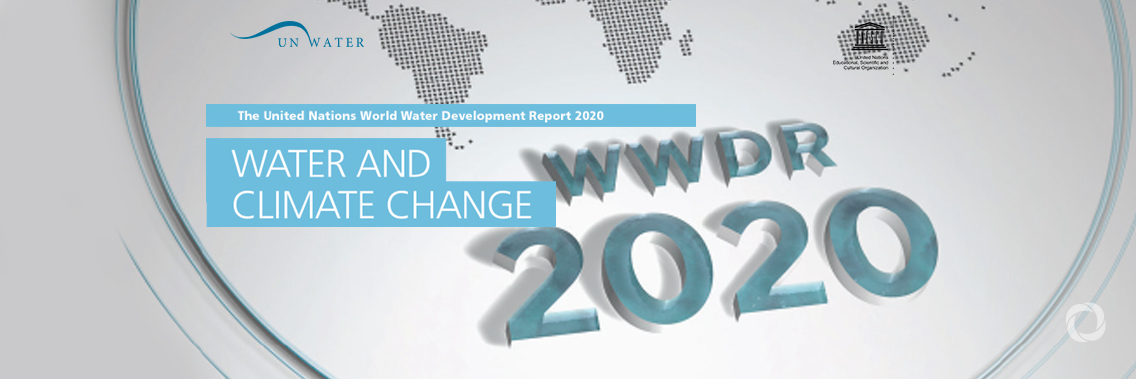Climate change will affect the availability, quality, and quantity of water needed for basic human needs, thus undermining the enjoyment of the basic rights to safe drinking water and sanitation for billions of people, warns the latest UN World Water Development Report. The authors call on States to make more concrete commitments to address the challenge.
Such a deterioration of the situation would only hinder the achievement of Sustainable Development Goal 6 which is part of the 2030 Agenda for Sustainable Development, according to which access to safe drinking water and sanitation must be guaranteed for all within ten years. This will be a considerable challenge – 2.2 billion people currently do not have access to safely managed drinking water, and 4.2 billion, or 55% of the world’s population, are without safely managed sanitation.
Water use has increased sixfold over the past century and is rising by about 1% a year. However, it is estimated that climate change, along with the increasing frequency and intensity of extreme events – storms, floods and droughts, will aggravate the situation in countries already currently experiencing ‘water stress’ and generate similar problems in areas that have not been severely affected. Furthermore, the report highlights the fact that poor water management tends to exacerbate the impacts of climate change, not only on water resources but on society as a whole.
The Chair of UN-Water, and President of the International Fund for Agricultural Development (IFAD), Gilbert F. Houngbo, says: “If we are serious about limiting global temperature increases to below 2°C and achieving the Sustainable Development Goals by 2030, we must act immediately. There are solutions for managing water and climate in a more coordinated manner and every sector of society has a role to play. We simply cannot afford to wait.”
Many ecosystems, particularly forests and wetlands, are also under threat, reducing biodiversity. Water supplies will be affected, not only for agriculture – which accounts for 69% of freshwater withdrawals – but also for industry, energy production and even fisheries.
Much of the impact of climate change on water resources will be manifested in the tropics, where most developing countries are located, with potentially apocalyptic consequences for small island states, some of which could be wiped off the map. Mountainous areas are also exceptionally vulnerable through impacts on mountain glaciers and snowcaps, which show a decreasing trend almost everywhere in the world. The authors recognize, however, that a number of uncertainties remain, particularly at the local level and due to the seasonal variability of rainfall patterns.
In the face of these threats, the report highlights the two complementary strategies to be implemented – adaptation and mitigation:
Wastewater treatment also contributes to climate change as it generates GHGs, accounting for an estimated 3% to 7% of all emissions. These emissions arise from both the energy required for wastewater treatment and the biochemical processes used. But because of the decomposition of the organic matter it contains, untreated wastewater is also a major source of methane, a powerful greenhouse gas. The report points out that wastewater harbours more energy than is needed for its treatment, provided, of course, that it is harnessed. It is estimated that worldwide, between 80% and 90% of wastewater is discharged to the environment without any form of treatment.
In concrete terms, the optimal management of water resources means investing in modern treatment techniques that allow for the extraction of methane from organic matter and then use this biogas to generate the energy needed to run the process.
The question of finance is obviously crucial. The authors point out that water resources management and water supply and sanitation services are underfunded and require greater attention from States. They argue that there are increasing opportunities to systematically integrate adaptation and mitigation planning into water-related investments, in order to make them more attractive to donors.
Various water and climate change initiatives can also bring co-benefits such as job creation, improved public health, poverty reduction, promotion of gender equality and improved livelihoods, further enhancing their attractiveness to donors.
The adoption of integrated adaptation and mitigation measures is a win-win proposition, conclude the authors of the report. They are clearly beneficial for the sustainable management of water resources and for the human right to safe drinking water and sanitation. They also directly address the causes and consequences of climate change, including in terms of the response to extreme weather events. Finally, they contribute to the achievement of several of the Sustainable Development Goals.
The United Nations World Water Development Report is UN-Water’s flagship report on water and sanitation issues, focusing on a different theme each year. It provides decision-makers with knowledge and tools to formulate and implement sustainable water policies.
Read and download the United Nations World Water Development Report.
Original source: UN-Water
Published on 21 March 2020

